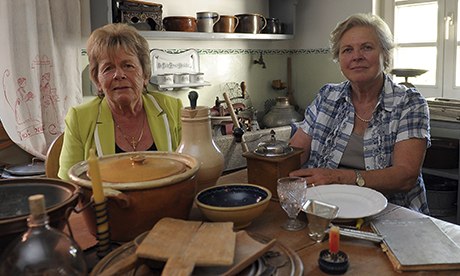Propositions in economics are rarely absolutely true or false – what is true in some circumstances may be false in others

Two Swabian housewives in Germany. 'One should simply have asked the Swabian housewife,' said German chancellor Angela Merkel after the collapse of Lehman Brothers in 2008. 'She would have told us that you cannot live beyond your means.' Photograph: Frederick Florin/AFP
The period since 2008 has produced a plentiful crop of recycled economic fallacies, mostly falling from the lips of political leaders. Here are my four favourites.
The Swabian Housewife: "One should simply have asked the Swabian housewife," said German chancellor Angela Merkel after the collapse of Lehman Brothers in 2008. "She would have told us that you cannot live beyond your means."
This sensible-sounding logic currently underpins austerity. The problem is that it ignores the effect of the housewife's thrift on total demand. If all households curbed their expenditures, total consumption would fall, and so, too, would demand for labour. If the housewife's husband loses his job, the household will be worse off than before.
The general case of this fallacy is the "fallacy of composition": what makes sense for each household or company individually does not necessarily add up to the good of the whole. The particular case that John Maynard Keynes identified was the "paradox of thrift": if everyone tries to save more in bad times, aggregate demand will fall, lowering total savings, because of the decrease in consumption and economic growth.
If the government tries to cut its deficit, households and firms will have to tighten their purse strings, resulting in less total spending. As a result, however much the government cuts its spending, its deficit will barely shrink. And if all countries pursue austerity simultaneously, lower demand for each country's goods will lead to lower domestic and foreign consumption, leaving all worse off.
The government cannot spend money it does not have: This fallacy – often repeated by British prime minister David Cameron – treats governments as if they faced the same budget constraints as households or companies. But governments are not like households or companies. They can always get the money they need by issuing bonds.
But won't an increasingly indebted government have to pay ever-higher interest rates, so that debt-service costs eventually consume its entire revenue? The answer is no: the central bank can print enough extra money to hold down the cost of government debt. This is what so-called quantitative easing does. With near-zero interest rates, most western governments cannot afford not to borrow.
This argument does not hold for a government without its own central bank, in which case it faces exactly the same budget constraint as the oft-cited Swabian housewife. That is why some eurozone member states got into so much trouble until the European Central Bank rescued them.
The national debt is deferred taxation: According to this oft-repeated fallacy, governments can raise money by issuing bonds, but, because bonds are loans, they will eventually have to be repaid, which can be done only by raising taxes. And, because taxpayers expect this, they will save now to pay their future tax bills. The more the government borrows to pay for its spending today, the more the public saves to pay future taxes, cancelling out any stimulatory effect of the extra borrowing.
The problem with this argument is that governments are rarely faced with having to "pay off" their debts. They might choose to do so, but mostly they just roll them over by issuing new bonds. The longer the bonds' maturities, the less frequently governments have to come to the market for new loans.
More important, when there are idle resources (for example, when unemployment is much higher than normal), the spending that results from the government's borrowing brings these resources into use. The increased government revenue that this generates (plus the decreased spending on the unemployed) pays for the extra borrowing without having to raise taxes.
The national debt is a burden on future generations: This fallacy is repeated so often that it has entered the collective unconscious. The argument is that if the current generation spends more than it earns, the next generation will be forced to earn more than it spends to pay for it.
But this ignores the fact that holders of the very same debt will be among the supposedly burdened future generations. Suppose my children have to pay off the debt to you that I incurred. They will be worse off. But you will be better off. This may be bad for the distribution of wealth and income, because it will enrich the creditor at the expense of the debtor, but there will be no net burden on future generations.
The principle is exactly the same when the holders of the national debt are foreigners (as with Greece), though the political opposition to repayment will be much greater.
Economics is luxuriant with fallacies, because it is not a natural science like physics or chemistry. Propositions in economics are rarely absolutely true or false. What is true in some circumstances may be false in others. Above all, the truth of many propositions depends on people's expectations.
Consider the belief that the more the government borrows, the higher the future tax burden will be. If people act on this belief by saving every extra pound, dollar, or euro that the government puts in their pockets, the extra government spending will have no effect on economic activity, regardless of how many resources are idle. The government must then raise taxes – and the fallacy becomes a self-fulfilling prophecy.
So how are we to distinguish between true and false propositions in economics? Perhaps the dividing line should be drawn between propositions that hold only if people expect them to be true and those that are true irrespective of beliefs. The statement, "if we all saved more in a slump, we would all be better off," is absolutely false. We would all be worse off. But the statement, "the more the government borrows, the more it has to pay for its borrowing," is sometimes true and sometimes false.
Or perhaps the dividing line should be between propositions that depend on reasonable behavioural assumptions and those that depend on ludicrous ones. If people saved every extra penny of borrowed money that the government spent, the spending would have no stimulating effect. True. But such people exist only in economists' models.
